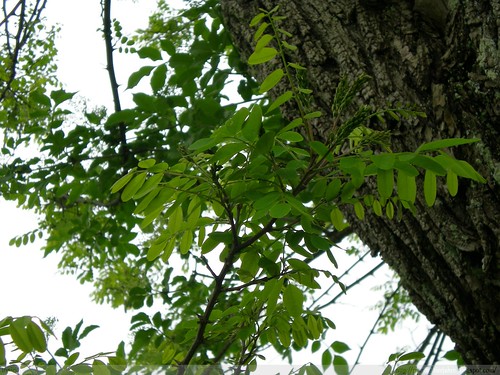You'll probably remember my story about a parasitic elder growing on top of a maple tree.
Well, now the "maple" has finally grown its own leaves and I discovered that it is not a maple tree at all! It has pinnate leaves, instead of the well known maple tree leaves. Its trunk does not quit look like the other maple trees either and the branches have thorns. 
Those leaves remembered me of some acacia that grew in my birthplace as I was a child. I liked the oval form of its leaflets very much. After some internet research, I came across what I think is the real identity of my mystery host tree: it is no acacia, but a black locust (Robinia pseudoacacia), also known as false acacia, because it bears a striking similarity to them.
Now I'm not so sure that the elder slowed down the false acacia in growing leaves. Maybe it's just that maple trees are much faster than false acacias. But I discovered some (not parasitised!) false acacias quite close. They have all their leaves, too, but I don't know when did they grew them.
I'm going to have to continue my field research next year!
Monday, 4 May 2009
Elder revisited
Labels:
amendments,
nature
Subscribe to:
Post Comments (Atom)

 versión en español
versión en español







2 comments:
Es ist definitiv eine Akazie (Robinia pseudoacacia) wie wir sie hier im Norden kennen.Sie hat weisse traubenartige Blueten ,und verbreitet einen Duft von Suesse, Milde, und Sommer,der einem fast die Sinne raubt.Irgend jemand hat mal den Spruch gesagt "Setz Dich unter eine bluehende Akazie und du Wirst Deine Sorgen vergessen."
Ich freue mich auf meine im Garten wenn sie anfaengt zu bluehen.Leider ist sie ein wilder Wucherer.Wo immer ein Samenkorn von ihr hinfaellt wuchert sie weiter.
Imker stellen gerne ihre Bienenstoecke unter ihnen auf.Der Honig bekommt dadurch seinen bes.Geschmack.LG.G
Gitta said...It is definitely an acacia (Robinia pseudoacacia) as we know it here in the North. It has white grape-like flowers and spreads a sweet, benign and summerlike fragrance that might make you loose your sense. Someone told "Sit under a blooming acacia and you will forget all your troubles."
I look forward to the acacia that grows on my garden as it begins to bloom. Unfortunately it is a wild racketeer. It grows wherever it drops a seed. Beekeepers like to place their beehives under acacias. Honey gets then its special taste. LG. G
Gitta, you are right. The fragrance of the blooming acacias is something great. And imagine the one in the picture, where you can smell both elderflowers and acacia flowers. Fantastic! :)
LG
T.
Post a Comment